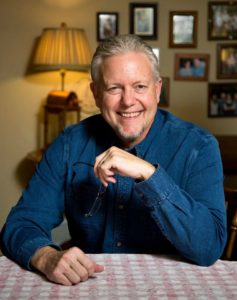“THIS is how you treat people!” I proclaimed, a quiver in my voice.

Just before Christmas, 1995 a textile mill in Lawrence, Massachusetts was destroyed by fire. About 1,400 people worked at Malden Mills. The owner of the mill, Aaron Feuerstein, spoke before the employees’ days after the fire. “I am not throwing people out of work two weeks before Christmas,” was his famous line. Feuerstein then and there declared that he would pay his workers their wages, even though the mill was closed, and they could not work.
It was early in 1996 that an NBC News feature covered the incident. Feuerstein’s reputation as a beneficent corporate citizen soared. Feuerstein continued to pay his workers for months – without a product being produced – while the mill was being rebuilt. I showed that news story to my high school students for years, always ending with my line above, “THIS is how you treat people.” 
Aaron Feuerstein was a rich man who had made millions from his plant. He could have easily, as he said in his first news interview, claimed the insurance money and walked away. But he didn’t. Feuerstein not only continued to pay his employees, but he also rebuilt the mill, and created an innovative, cold-weather material. The mill continued to produce for another decade before economic hardships closed its doors.
 Aaron Feuerstein was 95 when he died this week. I just read the Boston Globe story, tears filling my eyes. My mind has not changed since I first read of Feuerstein’s care for his workers. As you might imagine, his workers cheered and wept in response to Feuerstein’s magnanimous empathy toward them in 1995 and beyond. As one man remembered in the NBC feature, “I have never seen so many grown men cry.”
Aaron Feuerstein was 95 when he died this week. I just read the Boston Globe story, tears filling my eyes. My mind has not changed since I first read of Feuerstein’s care for his workers. As you might imagine, his workers cheered and wept in response to Feuerstein’s magnanimous empathy toward them in 1995 and beyond. As one man remembered in the NBC feature, “I have never seen so many grown men cry.”
I can only imagine how long the funeral procession will be for Mr. Feuerstein. When asked what he wanted his tombstone to read, his response was immediate, “Hopefully it’ll be, ‘He done his damnedest,’ you know, that I didn’t give up and I try to do the right thing.” 
Something that is missing in all the mainstream reportage of Mr. Feuerstein is the answer to the question, “Why did he do it? Why did he continue to pay his workers when he didn’t have to?” The answer, according to Mr. Feuerstein, is found in the Torah, the Jewish law code embedded in the Bible books Genesis through Deuteronomy.
Feuerstein was invited to speak at MIT the year after the mill fire and his generosity on behalf of his workers. It was in that audience of MIT business leaders Feuerstein revealed the answer to the question, “Why?” It was there he said,
“I remember as a young boy, five or six years old, sitting at my father’s table,” he told the audience during the question-and-answer period. The discussion was about his grandfather who, when he started the business, insisted on paying his workers before sunset. His father explained that the practice was cited in the Torah, in the book of Deuteronomy (24: 14-15). Mr. Feuerstein read the passage in Hebrew and English.
“`You should not oppress the worker. He is poor and needy, whether he be thy brethren or a stranger’–and by stranger they meant all people, all faiths, all races,” he said. “`And the very day of his work, you have to pay him his wages. And the sunset should not appear upon these unpaid wages because he can’t afford it, and he would cry out against you to God, and you would have sinned.'” [“Malden Mills Owner Applies Religious Ethics to Business.”]
“THIS is how you treat people,” is based on Hebraic law. Employers everywhere still have much to learn from Mr. Feuerstein. And I, tears still filling my eyes, want everyone to know the story of Malden Mills and the Hebrew teaching that motivated one man’s care for others.

Subscribe to MarkEckel.com (here). Find the MarkEckel.com YouTube Channel (here). Mark is President of The Comenius Institute (website). Dr. Eckel spends time with Christian young people in public university (1 minute video), teaching at Indiana University Purdue University at Indianapolis, and interprets culture from a Christian vantage point (1 minute video). Consider becoming a Comenius patron (here).
Picture Credits: Luke Renoe, Snappy Goat, Boston Globe, sfchronicle.com, list23.com, Eagle – Tribune



 THE TRUE 1% Thank you for 20 years of no 9-11s. These veterans represent the thousands who volunteered to stand between us and those at war with America. They protected our nation and gave us peace. American servicemen – the true 1 % of our population – deserve all the credit for American resolve, tenacity, agility, and success. Our military was victorious every day for 20 years in Afghanistan. Thank you
THE TRUE 1% Thank you for 20 years of no 9-11s. These veterans represent the thousands who volunteered to stand between us and those at war with America. They protected our nation and gave us peace. American servicemen – the true 1 % of our population – deserve all the credit for American resolve, tenacity, agility, and success. Our military was victorious every day for 20 years in Afghanistan. Thank you 































































